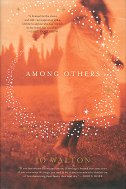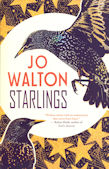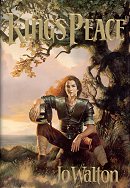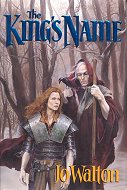‘Here in the Just City you will become your best selves.
You will learn and grow and strive to be excellent.’
FACTS FOR TRAVELLERS
NAME: Kallisti
NICKNAME: ‘The Just City’
POPULATION: 10,520 children, 300 philosophers, Sokrates, Athene, An unknown number of robots
LANGUAGES: Classical Greek, Latin
LOCATION: Thera (aka Atlantis)
CLIMATE: Mediterranean
GOVERNMENT: Philosophical Monarchy
RELIGION: Hellenistic Pagan (with onsite gods)
SPORTS: Wrestling, Running in Armour, Archery
HOW TO GET THERE: Read Plato’s Republic and pray to Athene. Or be a ten-year-old girl. Or be a god
HOW TO LEAVE: You can’t
Having just finished
Plato at the Googleplex,
this seemed like the obvious next read.
The gods Athene and Apollo decide to set up and run a ‘Just City’,
following the rules Plato laid down in his Repbulic.
They find a suitably isolated island, and recruit a bunch of people from throughout history:
ones who have prayed to Athene to live there.
These people become the first rulers, and they buy cohorts of 10-year-old-slaves
(with some rather unfortunate repercussions on the local slave economy)
to become the first people actually fully raised according to Plato’s plan.
They all settle down to being the best selves they can be, for the most part.
Things are going along reasonably well, although the planned parenthoods,
and enslaved machines becoming sentient, are causing some wobbles.
Then they decide to introduce Sokrates to the mix...
This is a gentle novel with deep consequences.
It has three point-of-view characters – a god, a ruler, and a child –
as we see the Just City grow from its inception until the children reach adulthood.
I’m glad I had read
Plato at the Googleplex just before this,
as I am not as familiar with Plato’s philosophy as I could be.
My only previous information was from reading
Popper’s The Open Society and Its Enemies
many years ago,
and getting a rather less positive view of his philosophy.
Jo Walton’s novel of living in Plato’s Republic
steers a course between these two views.
There are certainly all the nasty totalitarian issues Popper rails against,
from the Noble Lie downwards,
but there are other problems in utopia.
In particular, the use of robots instead of slaves to do all
the scut-work initially seems to be a clever technological solution to a very real problem,
but it turns out to have problems of its own.
Most of the issues are experienced only second-hand through the viewpoint
characters, who have been raised or trained within the philosophy,
and are so less critical than we are.
The initial nerd-wish-fulfillment educational aspects, even when confronted with Sokratic stirring,
eventually have to give way to the underlying problems, however.
I thoroughly enjoyed this, and am looking forward to the sequel: The Philosopher Kings.
Be excellent!

















